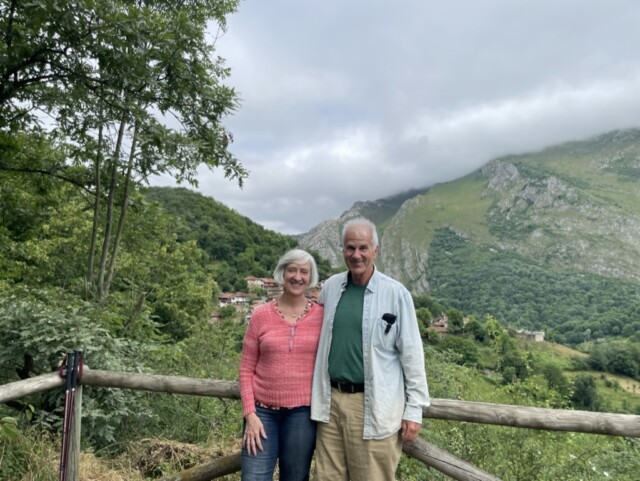
When Be Bad First came out in 2016, I often noted in interviews (and in the book itself) my belief that being able to learn new skills and new ways of operating was the key skill for success in this 21st century.
I still think that. And by the time my next book, Change From the Inside Out, came out in 2021, I had understood the profound two-way connection between learning and change: almost all external change requires learning, and real learning requires internal change.
Wait — What?
If that idea of the learning-change cycle doesn’t quite land in your brain, let me offer an example. In early 2016, I decided I needed a real learning challenge — partly to practice what I was preaching in Be Bad First, and partly because I’m committed to continually challenging myself. So, I decided to learn Spanish. I already knew a little of the language (like a lot of people, I took classes in junior high), so I wasn’t starting from zero…I figured that would make it easier. And it just seemed like having the ability to speak Spanish would give me more flexibility to interact and operate in this modern world.
I discovered a language learning app called Duolingo, (I highly recommend it if you’re trying to learn a language), and also found video content for learners from a variety of sources. Finally, I asked my colleague Vanessa Defournier, who is fluent in a number of languages, if she would be willing to have conversations with me in Spanish. These conversations challenged me more than any other aspect of my early learning journey. I had to continually manage my self-talk toward Of course I’m bad at this, I’m just getting started — and I know I can improve and away from Oh my god, I’m such an idiot, and she’ll think I’m lame.
Next Level of Learning Difficulty — and Change
The next year my dear husband Patrick suggested that we vacation somewhere in the Spanish-speaking world, so I would have a chance to practice. After some research we settled on Asturias, a province in the north of Spain. We both fell in love with the place and the people (and the food!) — and it was a great place to practice, because almost no one there speaks English. (They have tourists — but the vast majority are from other parts of Spain.)
So, for the first time, I had to speak Spanish — if I wanted to get directions, to buy anything, to order food, I didn’t have a choice. It was a change that required me to turbo-charge my learning; and for the first time, my language learning path was requiring me to change critical aspects of how I was thinking and behaving. There was the two-way cycle: an external change (having to speak another language to operate day-to-day) required learning (improving my Spanish); the learning required internal change (thinking, listening and responding in new and untested ways).
Ramping Up the Change/Learning Challenge
As I noted, we both loved Asturias right away, and so we went back every year (except for the 2020 pandemic year), and when we returned at the end of 2021, we looked at each other and said “We want to live here part-time.” And that ramped up both the change and the learning dramatically. Now I was going to have to speak Spanish well enough to find and buy an apartment; open a bank account; get utilities, internet and phone service; contract for any needed renovations…etc., etc. And that was just the nuts-and-bolts stuff. We also wanted to understand the local and national culture, make friends, understand references and jokes, be — ultimately — supportive and helpful members of the community.
So much learning! So many changes! (And at this point, Patrick decided he really needed to learn Spanish as well, so he started his own Duolingo journey.)
Fast forward: now in March of 2023, we have an apartment that we love and some wonderful new friends; we seem to be navigating all the Spanish/Asturian policies and procedures and figuring out how to do fun stuff as well (concerts, yoga classes, museums and historical sights, visiting new areas and trying new restaurants).
But my learning journey continues — and is in some ways even more challenging. Every day I find subtle and not so subtle differences in language and culture that I have to learn and incorporate, and I’m continually running up against my own discomfort and negative self-talk about learning and change. Here are the main things I’m learning abut learning -
Being Good at Learning/Change
Be kind to yourself: Almost every time I make a mistake in conversation with someone (or even while doing Duolingo, which is still my go-to), my default is still to feel frustrated/embarrassed. I’m learning to say kinder, more supportive things to myself instead — Well, it was mostly right — at least they understood you vs. Why can’t I get that? What’s wrong with me? That hopeful self-talk is both more accurate and more motivating — and it feels a lot better, too.
Pick your shots: When you take on a big learning challenge, it’s important to chunk it into pieces and prioritize the pieces so you don’t get overwhelmed.For instance, in Spain everyone uses the informal third person plural (vosotros) of verbs, while almost all Latin American speakers use the formal (ustedes). I only know the Latin American approach, and I’ve decided that learning the “vosotros” conjugation isn’t a priority while I’m still working on vocabulary and getting my verb tenses right. It doesn’t get in the way of people understanding me — I’ll learn it later.
Be help-able: We will be forever grateful to our real estate agent and now friend, Antonio. He found our lovely apartment and held our hands (almost literally) through the buying process; he has connected us with great contractors; he supported us through the weirdly complex and time-consuming process of getting the power turned on. He answers my questions, is patient with my mistakes, helps us understand the culture, is endlessly funny and kind. In most learning journeys, you can find people who both want to help and are able to help — let them. Otherwise, you’ll be making it much harder on yourself than it needs to be.
Celebrate the wins: I may not have understood every word, and sometimes I had to ask people to repeat things, but — by god — we bought an apartment in Spanish! We’ve gone out with new friends and had 2‑hour conversations and everybody had fun and mostly understood each other — I even got the jokes! Recognizing and giving yourself props for your progress when you’re in the middle of a long learning journey is essential to your mental health.
Realize there is no finish line: When you’re learning something big and important to you — speaking a new language; being a better leader; operating well in a new company, industry or job; addressing climate change — it’s critical to understand that there will never a be a point when you’re done learning. I was talking to a colleague the other day who’s going to be on my podcast, and she’s very nervous about it because she’s not a native English speaker. From my perspective, her English is perfect — other than her charming French accent, I would consider her 100% fluent. But she feels like she’s still learning, and isn’t completely confident about her ability to express herself in this alternative language. When she said that, I realized that when (I hope) my Spanish gets as good as her English is — I’ll still feel like I have a lot to learn! Framing this fact as a gift (I get to keep learning and growing) vs. a problem (What? I have to keep working on this?) will make your life in learning very much more pleasant.
So — all good luck on your learning challenges, whatever they may be, and as they say in Spain, Nunca es tarde para aprender. It’s never too late to learn…

4 comments
Saheed
August 18, 2023 at 4:08 am
Great work
Erika Andersen
August 18, 2023 at 10:24 am
Thank you!
Ruben
February 20, 2024 at 10:12 pm
inspiring.
Erika Andersen
February 21, 2024 at 2:42 am
Thank you — so glad it resonated for you!
Erika